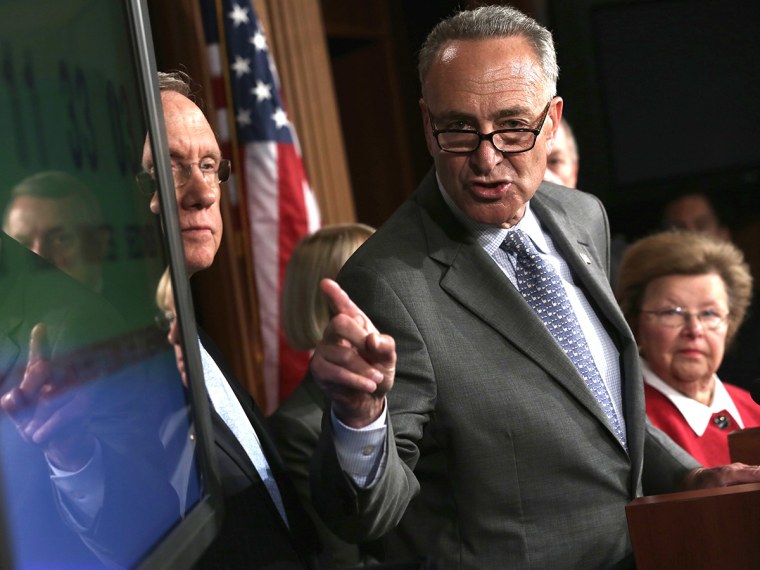All available evidence suggests Democrats are facing an uphill climb in the 2014 midterms. It's not that Republicans are more popular than Dems (they're not), or that the GOP's ideas enjoy more support (they don't), but Democratic turnout is expected to be pretty low this year, as is often the case in midterm cycles.
Given this, I recently suggested it'd make sense for Democrats to put together some kind of platform, telling voters what Dems will do if they're in the majority, and giving the Democratic base some incentive to show up.
Party leaders appear to be thinking along similar lines, though they're unveiling an agenda for 2014, not 2015.
Senate Democrats unveiled on Wednesday a strategy they believe can preserve their majority: pairing campaign-style votes with legislation that might actually get some Republican support. Democrats hope to draw bright contrasts with Republicans on issues that appeal to the Democratic base like the minimum wage, paycheck fairness for women and protecting Medicare benefits. But they also want to push bills that could get some GOP buy-in, such as proposals to spur manufacturing and increase energy efficiency.
Sen. Chuck Schumer (D-N.Y.), who reportedly helped shape the agenda with Sen. Debbie Stabenow (D-Mich.), told reporters last night, "We want to work with our colleagues. But we're also our going to make crystal clear whose side each party is on. Democrats are fighting for a fair shot for everyone, while Republicans are doing the bidding of the Koch brothers, the wealthy and huge corporations. That's the distinction we will draw in November."
The plan, apparently, is for Senate Democrats to line up a series of votes in the coming months on popular, progressive ideas. They know, of course, that the Senate Republican minority will likely block all of the measures, which can't pass the GOP-led House anyway, but the point is to highlight the differences between the parties with specific proposals, not vague rhetoric.
So they're presenting an agenda they're calling "A Fair Shot For Everyone."
What's in it? Quite a bit, actually.
Senate Dems published a list on Twitter last night:
* Minimum Wage Fairness Act
* Paycheck Fairness Act
* Revitalizing Manufacturing
* College Affordability
* Protect Medicare
* Keep Jobs in America
* Job Training to Close the Skills Gap
* Making Child Care Affordable
* Infrastructure
* Tax Fairness
For now, there are no additional details available on any of these 10 policies -- though some, such as the "Minimum Wage Fairness Act," are easy to figure out -- but presumably more information will be available as votes are scheduled.
The next question, of course, is whether this will be effective as an outreach tool.
If elections are about contrasts, there's certainly nothing with highlighting the broad differences between the parties, especially if Democratic ideas tend to have more public support. Whether or not voters -- or news organizations covering Capitol Hill -- will be impressed by a series of unsuccessful "message" votes is less clear.
But I'll also be eager to see the extent to which Senate Dems take this seriously. When I was looking for additional information about "Fair Shot" this morning, for example, I went to the Senate Democrats' page and noticed it made literally no reference to the agenda. So I went to the Democratic Senatorial Campaign Committee's website, but it didn't mean the agenda, either.
That's not a great sign.
Eventually, I tracked down a press release on the site for the Democratic Policy & Communications Center.
